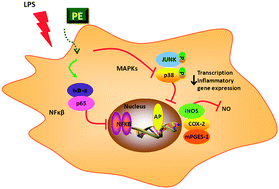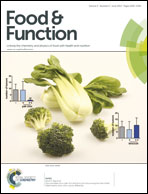Extra virgin olive oil polyphenolic extracts downregulate inflammatory responses in LPS-activated murine peritoneal macrophages suppressing NFκB and MAPK signalling pathways
Abstract
Extra virgin olive oil (EVOO) is obtained from the fruit of the olive tree Olea europaea L. Phenolic compounds present in EVOO have recognized anti-oxidant and anti-inflammatory properties. However, the activity of the total phenolic fraction extracted from EVOO and the action mechanisms involved are not well defined. The present study was designed to evaluate the potential anti-inflammatory mechanisms of the polyphenolic extract (PE) from EVOO on LPS-stimulated peritoneal murine macrophages. Nitric oxide (NO) production was analyzed by the Griess method and intracellular reactive oxygen species (ROS) by fluorescence analysis. Moreover, changes in the protein expression of the pro-inflammatory enzymes, inducible nitric oxide synthase (iNOS), cyclooxygenase (COX)-2 and microsomal prostaglandin E synthase-1 (mPGES-1), as well as the role of nuclear transcription factor kappa B (NFκB) and mitogen-activated protein kinase (MAPK) signalling pathways, were analyzed by Western blot. PE from EVOO reduced LPS-induced oxidative stress and inflammatory responses through decreasing NO and ROS generation. In addition, PE induced a significant down-regulation of iNOS, COX-2 and mPGES-1 protein expressions, reduced MAPK phosphorylation and prevented the nuclear NFκB translocation. This study establishes that PE from EVOO possesses anti-inflammatory activities on LPS-stimulated murine macrophages.


 Please wait while we load your content...
Please wait while we load your content...